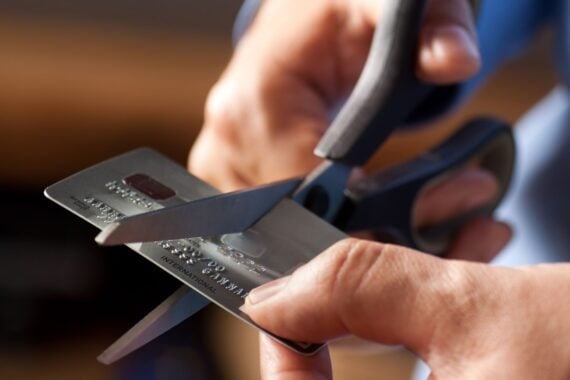Credit card debt is rampant in the U.S., affecting over a third of Americans, according to a recent Bankrate survey. But it’s not often that you hear from folks struggling with debt, in part because they’re too embarrassed or ashamed to ask for help. An r/PersonalFinance Redditor recently admitted as much in a popular post, writing that they were hiding their $30,000 in debt from nearly everyone in their life. But thanks to the veil of internet anonymity, they were able to ask Redditors how to pay off their credit card debt. And the nerds of r/PersonalFinance obliged with some pretty helpful advice, the most relevant of which we’ve compiled below.
Related: Credit Card Debt Has Risen to Record Levels — Here’s How to Get Out of It
Increase Income, Reduce Expenses

To give yourself some financial wiggle room to pay off debts, you’ll want to increase your income and/or reduce your expenses. Professionally, you can shoot for a raise, try to find a higher-paying position, or work a second job. Otherwise, you’ll need to cut major costs by opting for a cheaper apartment, getting a roommate, or driving a cheap car. The bottom line: Up your income and lower your expenses however you can.
Related: 31 Simple Ways to Save Money Every Day of the Month
The Snowball Method

The snowball method is simple: You pay off debts in order of smallest to largest — regardless of the interest rates. That means making minimum payments on all but the smallest account. Some know-it-alls might argue that this makes little sense. Why not go after the heftiest high-interest account that’s growing the most? Well, imagine chipping away at $20,000. It’s going to take a while before you see any progress, so you’ll be easily discouraged. By tackling the smallest debt first — and then rolling over those payments into the next smallest — you’ll make headway and stay motivated.
Related: How to Deal With Debt Collectors, According to Experts
The Avalanche Method

If your resolve isn’t an issue, then you can opt for the debt avalanche method. As the opposite of the debt snowball approach, you’ll focus on paying the highest interest debt first, making minimum payments on all other accounts. Once you’ve paid off an account, you move to the next highest interest debt — and so on. Again, this method only works if you aren’t discouraged by seemingly insurmountable, long-term goals.
Related: OK, Boomer: 7 Outdated Money-Saving Tips That You Should Ignore
Live Like You’re Broke

You’re not going to get out of credit card debt if you’re living high on the hog. “The only time you see the inside of a restaurant is if you work there. Stop using credit cards. No vacations. Cancel all subscriptions,” one commenter writes. And if that seems unsustainable (or harsh), another Redditor suggests sticking to a small budget to spend on things that make you happy.
For more personal finance advice, please sign up for our free newsletters.
Destroy Your Cards

Grab a pair of scissors, channel your pent up frustration, and go full Freddy Krueger on your credit cards. This is preferable to canceling them, as closing the accounts can lower your credit score.




